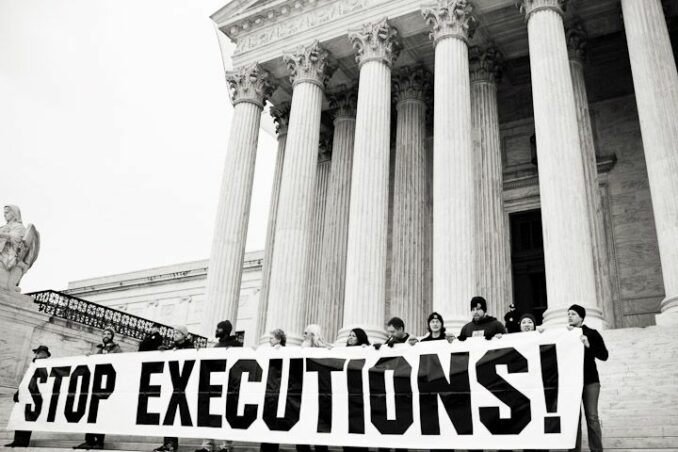Death penalty in U.S. is dying – but not dead yet
It is a slow and painful death, but executions in the U.S. are going to die! The death penalty is gasping its last breaths as even Republicans are condemning it these days.

Activists protesting the death penalty in front of the United States Supreme Court in 2017.
The big picture of capital punishment is that the United States is moving away from the death penalty. Here are some new facts:
- For the first time in the U.S., a majority of people believe that the death penalty is applied unfairly, according to an October 2023 Gallup Poll.
- Twenty-six states, a slim majority, have either abolished the death penalty (23) or have a moratorium on executions in place (3).
- In 2023, only five states conducted executions and seven states imposed new death sentences, the lowest numbers in 20 years.
- There were three people exonerated on death rows in 2023, bringing the total number of exonerations to 195 since the death penalty was reinstated in the U.S. in 1976.
Texas was one of just five states to carry out executions in 2023, but led the country with eight people put to death. The other four states were Alabama (2), Florida (6), Missouri (4) and Oklahoma (4).

Graphic: Ronnie Goodman
Even in Texas, which leads the U.S. with total 586 executions, change is coming. Death sentence convictions have fallen from a high of 48 in 1999 to three people sent to death row by Texas juries in 2023. Convictions with a death sentence have been in single digits for the past nine years in Texas.
Virginia made history in 2021 when it became the first former Confederate state to abolish the death penalty. Now two other former Confederate states, Kentucky and Missouri, along with Ohio, have bills to abolish the death penalty before their legislatures.
Representative Jim Murphy, a Missouri Republican, told the media that he “believes the death penalty is something that we really need to examine and put to an end because there’s just too many errors to be made and it’s just too big an error to make.” (tinyurl.com/mthy79kv)
So, there is definitely some good news. But the horrors of executions do continue unabated.
Death penalty still despicably racist, and torture
But the flip side of this big picture is that the death penalty is still despicably racist, and is still torture. It is still killing people who had totally incompetent attorneys, people who are mentally ill, and people with extremely low mental abilities. And it is still killing innocent people.
According to the Death Penalty Information Center, “79% of the people executed this year [2023] had at least one of the following impairments: serious mental illness, brain injury, developmental brain damage, an IQ in the range considered intellectually disabled, and/or chronic serious childhood trauma, neglect and/or abuse. One-third or eight of the people executed had all three. At least three prisoners were under the age of 20 at the time of their crimes.”
This is important because death penalty proponents and district attorneys, more often than not, dehumanize people in order to rationalize their killing. Prosecutors make those on trial out to be “monsters” who have to be eliminated. But the fact is that all of them needed help, likely throughout their whole lives, and the capitalist system totally failed them.
Innocent, but still sentenced to death row
High profile innocence cases in several states have recently received intense media attention but found little relief in the courts. Otherwise, there would not be one person found innocent for every eight that are executed.
The Trump appointees to the U.S. Supreme Court, the court of last resort, are ruling against almost every death row appeal or are just refusing to even hear the appeals.
Oklahoma is the state with the highest per capita number of executions. Recently, the case of Richard Glossip has garnered national attention. Glossip has spent 26 years on Oklahoma death row, had two trials, nine execution dates and three last meals. His ninth execution was stayed by the courts last May as Glossip was saying his last goodbyes to his loved ones, and now Glossip is asking the Supreme Court to throw out his 2004 murder conviction.
The New York-based Innocence Project said that Richard Glossip’s case is “a harrowing example of how the justice system can fail an innocent person. Glossip’s trial was tainted by prosecutorial misconduct, a leading cause of wrongful convictions.”
Two Texas cases of innocence received widespread media attention this past year.
On Jan. 11, 2023, the Texas Court of Criminal Appeals issued a three-page decision denying relief to Robert Roberson despite copious new evidence of his innocence, which was presented during Roberson’s nine-day evidentiary hearing in Anderson County.
Roberson, who was convicted and sentenced to death in 2003 for the death of his two-year-old daughter, Nikki, has consistently maintained his innocence. The evidence proves that Nikki’s death was a tragic accident exacerbated by her chronic illness, not a homicide.
In May, Roberson filed a cert [certiorari] petition with the Supreme Court asking the justices to reverse the lower court decision denying him a new trial. The justices declined to even consider his case. Roberson may be the only person on death row in the U.S. who was convicted under the “Shaken Baby” hypothesis, which is no longer considered a scientifically sound theory.
On June 28, 2023, the Texas Court of Criminal Appeals rejected Rodney Reed’s petition for relief despite significant evidence of his innocence and claims of prosecutorial misconduct that were well-documented during a weeks-long evidentiary hearing the year before. This is still being appealed.
Earlier, on April 19, 2023, the Supreme Court ruled in a 6-3 decision that the time limit had not run out on Reed’s request for DNA testing of key crime scene evidence, including the belt that was used to strangle the victim. Reed will now be able to pursue his quest for DNA testing in federal court.
“Painful, humiliating death” from nitrogen hypoxia
A recent court ruling in Alabama in January 2024 was shocking. A federal judge ruled that Alabama can execute using nitrogen hypoxia, which suffocates people by forcing them to breathe pure nitrogen.
Unless an appeals court intervenes, Kenneth Smith will be the first human being executed using nitrogen gas. The consequences of using this protocol are completely unknown, even to Alabama officials. The nitrogen is planned to be administered through a gas mask placed over Smith’s nose and mouth.
Alabama tried for four hours and failed to execute Smith in November 2022 using lethal injection, but abandoned its efforts when staff were unable to access a vein.
Last week, four United Nations experts expressed alarm over Smith’s upcoming execution. In their joint statement released on Jan. 3, the four independent U.N. monitors called on the U.S. government and Alabama to halt the execution. “We are concerned that nitrogen hypoxia would result in a painful and humiliating death,” the experts wrote.
The Rev. Jeff Hood, a spiritual advisor, plans to minister to Kenneth Smith in the death chamber. Hood said the Alabama Department of Corrections asked him to sign a form acknowledging the risks and agreeing to stay 3 feet away from Smith’s gas mask. Hood, a death penalty opponent, said that shows there is a risk to witnesses attending the execution.
“They’ve asked me to sign a waiver, which to me speaks to the fact that they’re already concerned that things could go wrong,” Hood said in an interview with NBC News after he filed a lawsuit against the Alabama Department of Corrections.
Mental illness and the death penalty
In a particularly sad case, Terence Andrus took his own life on Jan. 21, 2023, after struggling with mental illness while on Texas death row. On June 13, 2022, the U.S. Supreme Court denied Andrus’s petition for certiorari and summary reversal. Andrus was sentenced to death in 2012 after receiving abysmal legal representation at trial. His case went back and forth in several courts as Andrus kept trying to win a new trial but never succeeded. His suicide was the result of the system’s failure.
Syed Rabbani was resentenced to life in prison on Nov. 14, 2023, after spending 35 years under an unconstitutional death sentence in Texas. Since his conviction, his mental and physical health has significantly deteriorated. He is now bedridden, blinded by cataracts, and rendered nearly immobile and uncommunicative by a stroke.
On March 7, 2023, Andre Thomas’s April 5 Texas execution date was withdrawn. Thomas lives at the prison’s psychiatric facility, where he suffers from schizophrenia. He permanently blinded himself by gouging out both of his eyes in separate incidents — first while awaiting trial, and then again soon after arriving on death row. After he took out his second eye, he ate it. Why Thomas wasn’t determined to be mentally unfit for execution is a question never answered.
Before the crime, Thomas sought treatment for the symptoms of his severe mental illness, but no one responded to his increasingly desperate pleas for help over the course of many years. In 2004, he attempted suicide because he could no longer tolerate the voices in his head.
There are enough sad stories to fill a book. But the main thing is that this country, which was founded on genocide of the Indigenous peoples, and whose wealth is built on the unpaid labor and racist treatment of enslaved African people, has no right to imprison or execute any working person. Period.
The death penalty may be on its way out. But incarcerated people and their families and supporters must continue to struggle to dismantle the prisons and execution chambers brick by brick and wall by wall until the day comes when we have created a society that rules with justice for all.
Gloria Rubac is a leader of the Texas Death Penalty Abolition Movement.

